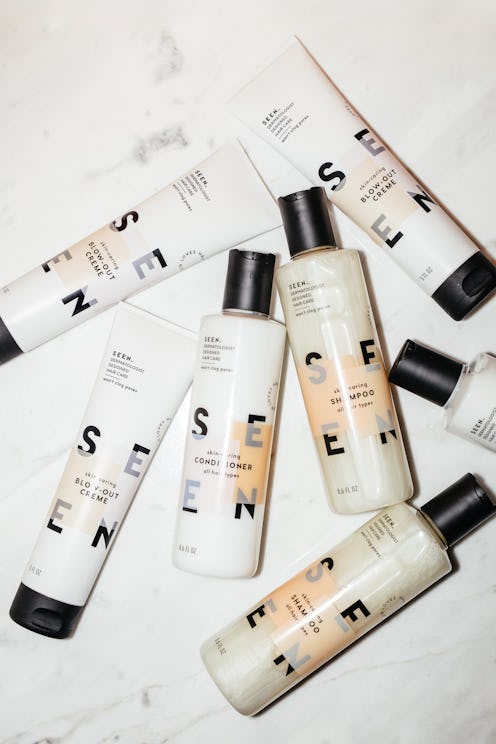(Beauty)
How This New Haircare Line Helps Your Skin, Too

The scene is set: Your skin has been cooperating lately and you're feeling the glow — when all of a sudden, out of nowhere, a breakout bursts your bubble. It's not that time of the month, and you haven't switched up your skincare routine... so what's to blame for the blemishes? Oddly enough, your shampoo may be the culprit. According to dermatologists, hair care products can cause breakouts, too.
This isn’t a unique situation. People all over the world deal with acne, redness, and sensitivity and wonder why — even dermatologists themselves. “Hair care products were a big source of breakouts for me,” Dr. Iris Rubin, dermatologist and co-founder of SEEN Hair Care, tells The Zoe Report. “I'm a Harvard-trained dermatologist, and surprisingly had not really learned much about the impact of hair care products on the skin during my training.”
Determined to get to the root of her acne, Dr. Rubin did independent research and created a spreadsheet of over 400 ingredients commonly found in hair care products. “I found that these products can be full of ingredients that can clog pores and lead to breakouts,” she says, which led her to start SEEN Hair Care, a line of non-comedogenic (aka, non-pore clogging) hair care products specifically formulated to care for your skin, along with your strands.
“What touches hair touches skin,” Dr. Rubin says. “And we are not just talking about your scalp — try putting something on your hair without it getting on your skin, it’s literally impossible.” She explains that shampoo rinses down the face, chest, and back; and conditioner and styling products, by design, leave behind a residue that can transfer from the hair to the skin. But unfortunately, eliminating irritating ingredients from your routine is harder than it seems.
“Many ingredients have no data on whether they can clog pores, and to make things more complex, some ingredients may be ‘safe’ on their own but clog pores when they combine with other ingredients,” Dr. Rubin tells us. “The only way to know if a product won’t clog pores is to test the finished product.” However, according to Dr. Rubin, “the vast majority” of hair care products are not tested for comedogenicity — so even though the American Academy of Dermatology recommends that people with acne or breakouts use hair care products that are non-comedogenic, finding products you can trust is a little tricky. Which is where SEEN comes in.
“SEEN products care for your hair and your skin,” Dr. Rubin shares. “What makes us different is that our formulations are clinically proven to be non-comedogenic and non-irritating, and we also have good-for-skin additives.” By packing SEEN shampoo and conditioner with skincare-level ingredients, like soothing chamomile and a plant-based silicone substitute to protect the skin’s barrier, the brand ensures that your hair care routine not only keeps pores free from build up, but also gives your skin an extra boost. “Our products are formulated without sulfates, silicones, phthalates, parabens, dyes, and gluten,” Dr. Rubin adds, citing that those ingredients have been shown to lead to irritation. And as a bonus, formulas without sulfates and silicones are typically gentle enough to work with naturally curly hair, too.
So if you’ve been struggling with breakouts but haven’t been able to figure out why, it might just be your shampoo and conditioner. "My recommendation is that if you have a breakout or irritation, ask yourself, What am I using that is new?" Dr. Rubin suggests. "While you can get a reaction from something you have been using for years, something new is more likely to be the culprit."
But instead of piling on the acne-fighting spot treatments or slathering your face in hydrocortisone cream ("too often we layer on more products to address an issue that is being caused by another product"), Dr. Rubin is a fan of the elimination method. Slowly cut potentially-irritating hair products out of your routine one at a time, and track any changes in your skin.
Moving forward, “It’s best to choose products with fewer ingredients as these contain fewer potential triggers,” Dr. Jennifer Herrmann, a dermatologist at MFC Dermatology and consultant for DNA Renewal, tells The Zoe Report. Look for hair care labeled "non-comedogenic," and only wash and restyle your hair when you absolutely need to, in order to avoid unnecessary product transfer. (Personally, I cover my face in a water-resistant cleansing balm, like Nyakio Beauty Sweet Almond Oil Cleansing Balm, while I shower to act as a barrier between my sensitive skin and potentially-irritating shampoo and conditioner).
Or, skip the tracking and stressing and just add SEEN's clinically proven, non-clogging, skin-soothing hair care products to your sink setup. After all, as Dr. Rubin says, “Why choose between beautiful hair and beautiful skin when you can have both?”